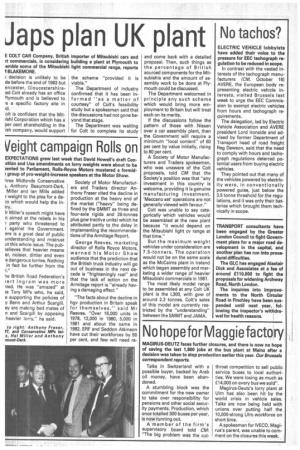Veight campaign Rolls on
Page 5

If you've noticed an error in this article please click here to report it so we can fix it.
EXPECTATIONS grew last week that David Howell's draft Coniction and Use amendments on lorry weights were about to be iented to Parliament, Rolls-Royce Motors mustered a formidgroup of pro-weight-increase speakers at the Motor Show.
hree Midlands Conservative • Anthony Beaumont-Dark, Miller and Ian Mills added r weight to the plea for a de)n which would help the intry.
Ir Miller's speech might have n aimed at the rebels in his party who threatened to against the Government. ere is a great deal of public understanding and mistrust ut this whole issue. The pub)elieves that heavier means er, noisier, dirtier and even e dangerous lorries. Nothing in fact be further from the he British Road Federation's )ert Ingram was more fled. He was "amazed" at ;e Tory MPs who, he said, e supporting the policies of y Benn and Arthur Scargill. ey are making bed mates of n and Scargill by opposing heavier lorry," he said. Society of Motor Manufacturers and Traders director Anthony Fraser cited the decline in production at the heavy end of the market ("heavy" being defined by the SMMT as three and four-axle rigids and 28-tonnes plus gcw tractive units) which he attributed partly to the delay in implementing the recommendations of the Armitage Report.
George Reeves, marketing director of Rolls Royce Motors, warned his Motor Show audience that the prediction that the British truck industry will go out of business in the next decade is "frighteningly real" and that the lack of action on the Armitage report is "already having a damaging effect."
"The facts about the decline in hgv production in Britain speak for themselves," said Mr Reeves. "Over 16,000 units in 1978, 12,000 in 1980, 5,000 in 1981 and about the same in 1982. ERF and Seddon Atkinson have cut their workforces by 50 per cent, and few will need re






































































